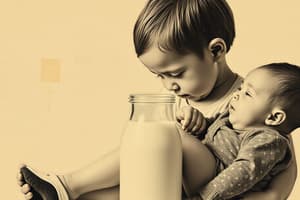Podcast
Questions and Answers
What is the effect of underfeeding cows on milk production?
What is the effect of underfeeding cows on milk production?
- Has no significant impact on milk quality
- Increases volume of output and lowers fat content
- Decreases both volume and fat content of output
- Increases fat content while reducing volume of output (correct)
Which characteristic describes colostrum produced within the first 7 days after calving?
Which characteristic describes colostrum produced within the first 7 days after calving?
- Saltier in taste and thicker in viscosity (correct)
- Thinner viscosity, less yellow in color
- Lower in nutrients and antibodies than regular milk
- High lactose and low fat content
What happens to fat globules in fresh, unprocessed milk when the milk stands?
What happens to fat globules in fresh, unprocessed milk when the milk stands?
- They rise to the surface and form cream due to density differences (correct)
- They increase in size and form a stable emulsion
- They become smaller and aggregate into larger clusters
- They dissolve completely into the watery portion of the milk
How does severe mastitis in cows affect their milk?
How does severe mastitis in cows affect their milk?
What is the primary role of casein in milk?
What is the primary role of casein in milk?
What is a consequence of prolonged heating of milk in terms of whey proteins?
What is a consequence of prolonged heating of milk in terms of whey proteins?
What is the purpose of fortifying milk with Vitamin D?
What is the purpose of fortifying milk with Vitamin D?
What effect does homogenisation have on milk?
What effect does homogenisation have on milk?
Which mineral is particularly valued for its presence in milk?
Which mineral is particularly valued for its presence in milk?
What occurs if too much non-fat dry milk is added to ice cream?
What occurs if too much non-fat dry milk is added to ice cream?
Flashcards are hidden until you start studying
Study Notes
Rearing of Cows and Milk Quality
- Cows fed grains produce milk with higher fat content compared to those on grass.
- Nutrient deficiencies in cows lead to them delivering essential nutrients to milk at the expense of their health.
- Underfeeding results in increased fat content and reduced milk volume.
Stages of Lactation
- Colostrum, produced within the first 7 days post-calving, is nutrient-rich, containing antibodies and growth factors.
- Colostrum is saltier, thicker, and more yellow than regular milk.
- Acceptance of colostrum decreases after the first 6 days.
Illness Impact on Milk
- Severe mastitis reduces milk production and alters milk composition, increasing fat and salt while decreasing lactose content.
Composition and Properties of Milk
-
Fat: Known as milkfat or butterfat, contains short-chain saturated fatty acids like butyric and caproic acids.
-
Fat globules cluster into larger groups when standing, resulting in cream rising due to fat's lower density.
-
Homogenization reduces globule size preventing creaming.
-
Protein: Milk is a complete protein source with casein and whey as the primary proteins.
- Casein: Precipitates during cheese-making and forms a soft curd at pH 4.6, causing milk to become opaque.
- Whey: Heat-sensitive, denatures with prolonged heating, contributing to scum formation on heated milk.
-
Lactose: Known as milk sugar, less sweet and less soluble; excess can lead to a sandy texture in frozen products.
-
Minerals: Contains essential minerals like calcium, phosphorus, magnesium, and sodium, with notable calcium value.
Milk Production Processing Steps
- Centrifugation & Separation: Skim milk has most fat removed, achieving a lower fat content.
- Fortification: Nutrient addition enhances milk's nutritional value; Vitamin D supports calcium and phosphorus absorption, while Vitamin A is added to low-fat and skim milk.
- Homogenization: Prevents cream separation by breaking fat globules into smaller units under high pressure, ensuring uniformity.
- Heat Treatment: Involves pasteurization to eliminate pathogens and extend shelf life.
- Filling & Packaging: Ensures proper storage for freshness and hygiene.
- Cooling: Rapidly cools milk post-processing to inhibit microbial growth.
- Distribution: Transport of milk to retailers while maintaining quality and safety.
Studying That Suits You
Use AI to generate personalized quizzes and flashcards to suit your learning preferences.




